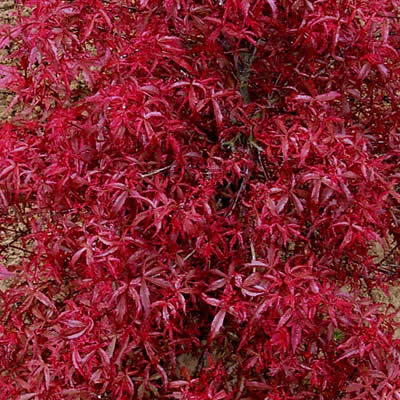Beni Komache Dwarf Japanese Maple |
|
|
Sapindaceae Acer Palmatum Beni Komache |
|
| Price |
|
| Availability and Options |
Temporarily Out Of Stock This product is temporarily out of stock. Restocks typically occur at the beginning of each week. Check back soon and sorry for the inconvenience! |
| Shipping Information | |
| Grows In | Zone 6A · -10° to -5° F through Zone 9B · 25° to 30° F Grows in Columbus! (Learn More) |
| Sun Exposure | Morning Sun / Evening Shade, Dappled Light / Filtered Sun |
| Soil Drainage | Well Drained |
| Resistent To | Deer Resistant, Heat |
| Blooms | Fall Foliage, Spring Foliage, Summer Foliage |
| Foliage Color | Burgundy, Red |
| Average Height | 5' to 6', 6' to 8', 8' to 10' |
| Average Width | 6' to 8' |
| Attracts | Visual Attention |
| Fragrances | None |
Gardener Direct offers over 150 outstanding and unique varieties of Japanese Maple. We are testing and adding new varieties every year. Our container-grown maples are expertly grown from grafts with the utmost care. Before we offer them for sale, plants are fully rooted and well-branched in 2, 3 or 5 gallon containers.
To determine hardiness and overall performance in the landscape, each variety of Japanese Maple has been field-tested in our trial gardens here in mid-Georgia. This means you can count on the specific information we provide about each plant.
 More about Beni Komache Japanese Maple...
More about Beni Komache Japanese Maple...Translated, the name Beni Komache means "beautiful red-haired girl," and this is one rare and beautiful Japanese Maple. It's compact habit makes Beni Komache perfect for smaller garden spaces and containers. Partial shade preferred.
The leaves of this dwarf are brilliantly colored and quite unusual. Each curly, 5-lobed leaf is separated entirely to the center. New foliage emerges and quickly turns intense bright crimson. As the leaf matures, the color darkens and older foliage becomes greenish-red. The margins remain edged in crimson, which is delicately woven along the toothed rim, giving the appearance of a lace work border.
Japanese maples stand out best when they are planted as a single specimen. Use them to accentuate an entryway or as a focal point to draw attention to a certain area of the landscape or home. Be careful not too overcrowd your Japanese Maple. We suggest underplanting with dwarf, low growing shrubs or groundcovers.
When provided the right environment in the landscape Japanese Maples are very easy to grow and care for, and long lived.
Soil - Japanese maples adapt well to many soil types provided there is good drainage. Consistently wet or soggy soils can be a killer.
Sun - Some varieties will tolerate full sun. However, in their natural habitat, Japanese Maples are understory trees, growing in dappled forest sunlight and at the edges of partially shaded woodlands. Ideally they prefer to be grown in similar conditions, especially in the warmer climate of the Deep South.
Pruning - When a specific variety of Japanese maple is planted in the right size space; where it have room to grow to mature size, rarely will it require pruning. That beings said, removal of damaged or stray branches that spoil the form of the tree can be performed almost any time of year. Heavy or major pruning is best left to professionals. If you hire someone to prune your Japanese maple make sure he/she has the credentials and ALWAYS check references.
Water - During the first two summers after planting a Japanese Maple, make sure to water enough to keep soil damp but not soggy. Constantly wet feet can cause serious problems. Proper planting method can ensure proper drainage over the long term.
SEE: Detailed Planting Instructions For How To Plant A Japanese Maple in the Ground
Arrive quickly and in good condition about 2 months ago they are both looking good
Hi Lonnie - Thanks so much for taking the time to provide us and visitors to Gardener Direct with your review. We're very happy to hear that the Japanese maples is doing fine and looking good. Let us know if there's ever anything else we can help you with or if you have any questions. We're at your service!